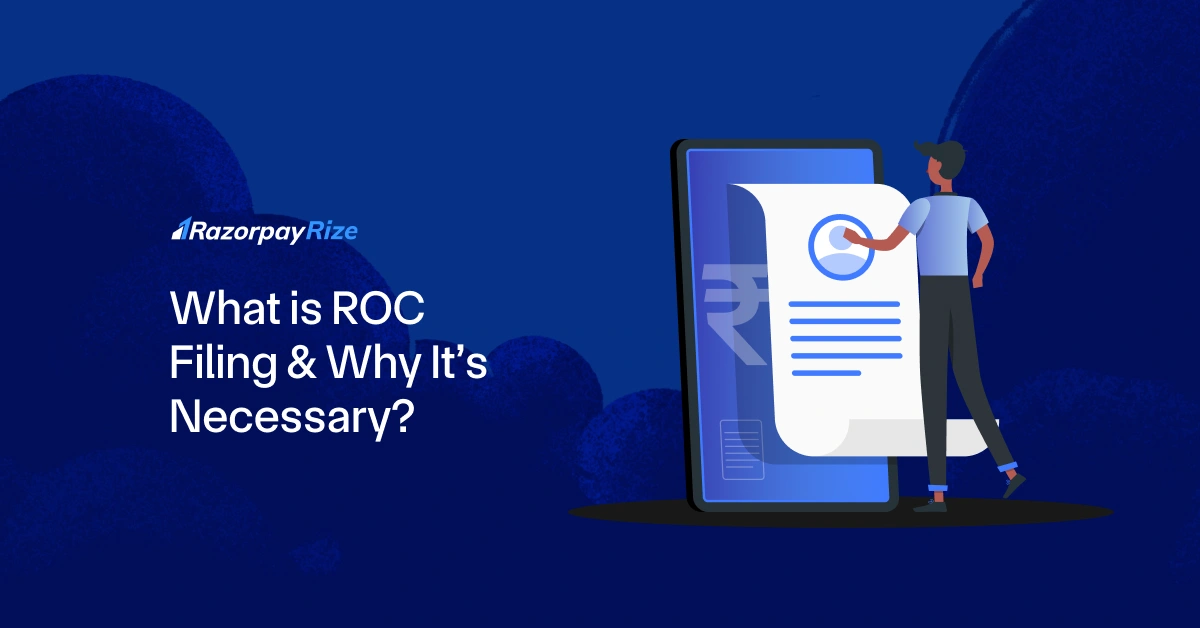For businesses registered under the Companies Act, ROC filing is a fundamental compliance requirement. It involves submitting financial statements, annual returns, and key business details to maintain transparency and legal accountability.
Timely filings not only prevent penalties but also strengthen your company’s credibility, making it more attractive to investors, lenders, and stakeholders.
Table of Contents
What Is ROC Full Form?
ROC stands for Registrar of Companies. It is a government body responsible for regulating and overseeing company registrations and compliance in India. The ROC plays a key role in corporate governance by maintaining company records, approving registrations, and ensuring adherence to statutory requirements.
About ROC Filing
ROC filing refers to the mandatory submission of financial statements and annual returns by companies to the Registrar of Companies. Under the Companies Act of 2013, all registered entities must comply with ROC filings to ensure proper documentation of their financial activities and operational status. Failure to comply can result in penalties, fines, or legal action.
Why ROC Filings Are Necessary?
ROC filings serve multiple purposes:
- Ensuring Legal Compliance: Companies must file returns and financial statements as mandated by law.
- Transparency & Financial Accountability: Stakeholders, including investors and creditors, rely on these filings to assess a company’s financial health.
- Regulatory Oversight: The government uses ROC filings to monitor corporate activities and prevent fraudulent practices.
- Avoiding Penalties: Late or non-compliance can result in heavy fines and even disqualification of directors.
Functions of ROC
The Registrar of Companies performs several key functions:
- Approves and registers new companies.
- Maintains company records and statutory filings.
- Monitors corporate compliance and governance.
- Regulates financial disclosures and annual returns.
- Handles company dissolution and winding-up processes.
Who Is Responsible For ROC Filings?
The responsibility for ROC filings lies with Company Directors, Company Secretaries & Auditors.
Failure to comply with ROC filing requirements can lead to penalties, disqualification of directors, and even company deregistration. Hence, the combined responsibility of directors, company secretaries, and auditors ensures the company remains legally compliant and operational.
ROC Filing Process: A Step-By-Step Guide
Step 1: Preparatory Board Meeting
Auditors and company officials prepare financial statements and reports.
Step 2: Subsequent Board Meeting
The Board of Directors reviews and approves the financial statements.
Step 3: Annual General Meeting (AGM)
Shareholders review and finalise financial reports and pass resolutions. The approved documents are submitted to the ROC.
Documents Required For ROC Filing
- Financial Statements (AOC-4): Balance sheet, profit & loss account, cash flow statement.
- Board’s Report: Overview of company operations, risk management policies.
- Annual Return (MGT-7): Company details, shareholding pattern.
- Auditor’s Report: Assessment of financial statements.
- Shareholder Resolutions: Approvals related to finances, and director appointments.
- Director Disclosures: Details of director interests and compliance declarations.
Due Date For ROC Filing
Key deadlines for different ROC filings include:
- AOC-4 (Financial Statements): Within 30 days of AGM
- MGT-7 (Annual Return): Within 60 days of AGM
ROC Filing Fees
ROC filing fees vary depending on company type, share capital, and document type. Fees may range from a few hundred to several thousand rupees.
The ROC fees for filing forms, including AOC-4 and MGT-7, are as stated below:
Amount of Penalty Levied On Late ROC Filing
- Delay in AOC-4 filing: ₹100 per day
- Delay in MGT-7 filing: ₹100 per day
- Persistent non-compliance may lead to company strike-off and director disqualification.
Company Registration by ROC
The Registrar of Companies (ROC) oversees the incorporation and regulation of companies under the Companies Act, 2013. Registering a company involves multiple steps, from obtaining name approval to compliance with statutory requirements post-incorporation. Below is a detailed breakdown of the process:
Step 1: Name Approval
Before registering a company, select a unique name and submit it for approval through the SPICe+ (Simplified Proforma for Incorporating a Company Electronically) Part A form on the Ministry of Corporate Affairs (MCA) portal.
Step 2: Submission of Incorporation Documents
Once the name is approved, the company must prepare and file the necessary incorporation documents. This is done through the SPICe+ Part B form on the MCA portal.
Step 4: Compliance with the Companies Act
After incorporation, the company must comply with several regulatory requirements, including:
- Opening a Business Bank Account
- Issuing Share Certificates
- Declaration of Business Commencement (INC-20A)
- Paid Ads: For targeted reach and faster growth
ROC Refusal For Company Registration
The ROC may refuse registration due to:
- Non-compliance with legal requirements.
- Similarity with existing company names.
- Incomplete or incorrect documentation.
- Business activities not aligning with statutory provisions.
To avoid rejection, ensure proper documentation, follow name guidelines, and meet statutory conditions.
{{company-reg-cta}}
Role of ROC After Registration of a Company
Once a company is registered, the Registrar of Companies (ROC) continues to play an important role in ensuring that the company complies with legal and regulatory requirements.
1. Monitoring Compliance with Statutory Requirements
After incorporation, companies must adhere to various statutory requirements to maintain legal standing. The ROC monitors compliance by ensuring that companies:
- Hold board meetings and general meetings as per legal requirements.
- Maintain statutory registers, including those related to shareholders, directors, and financial records.
2. Ensuring Timely Filing of Annual Returns & Financial Statements
The ROC mandates companies to submit annual filings to ensure financial transparency and accountability. Key filings include:
Mandatory ROC Filings:
- AOC-4 (Financial Statements)
- MGT-7 (Annual Return)
- DIR-3 KYC (Director KYC Compliance)
- INC-20A (Declaration of Business Commencement)
3. Overseeing Corporate Governance & Legal Transparency
The ROC plays a significant role in ensuring that companies maintain good corporate governance practices, such as:
- Ensuring fair and transparent financial reporting.
- Verifying changes in directorship.
- Monitoring mergers, acquisitions, and corporate restructuring processes.
Final Thoughts
Incorporating a company is just the beginning, ongoing compliance with ROC filings is key to sustaining a business.
Ignoring ROC filings can lead to fines, legal troubles, and even business deregistration while maintaining compliance opens doors to credibility, funding, and seamless operations. The choice is clear- businesses that prioritise regulatory adherence set themselves up for long-term success, while those that neglect it risk costly consequences.
Frequently Asked Questions
Private Limited Company
(Pvt. Ltd.)
- Service-based businesses
- Businesses looking to issue shares
- Businesses seeking investment through equity-based funding
Limited Liability Partnership
(LLP)
- Professional services
- Firms seeking any capital contribution from Partners
- Firms sharing resources with limited liability
One Person Company
(OPC)
- Freelancers, Small-scale businesses
- Businesses looking for minimal compliance
- Businesses looking for single-ownership
Private Limited Company
(Pvt. Ltd.)
- Service-based businesses
- Businesses looking to issue shares
- Businesses seeking investment through equity-based funding
One Person Company
(OPC)
- Freelancers, Small-scale businesses
- Businesses looking for minimal compliance
- Businesses looking for single-ownership
Private Limited Company
(Pvt. Ltd.)
- Service-based businesses
- Businesses looking to issue shares
- Businesses seeking investment through equity-based funding
Limited Liability Partnership
(LLP)
- Professional services
- Firms seeking any capital contribution from Partners
- Firms sharing resources with limited liability
Frequently Asked Questions
What is an ROC File?
A ROC (Registrar of Companies) file refers to the official documents and forms that companies must submit to the Registrar of Companies (ROC) under the Ministry of Corporate Affairs (MCA). These filings include annual returns, financial statements, and other regulatory documents that ensure compliance with the Companies Act, 2013.
Is ROC Filing Mandatory?
Yes, ROC filing is mandatory for all registered companies in India. Companies, whether private limited, public limited, or one-person companies (OPCs), must file annual returns, financial statements, and other required documents with the ROC.
What is an ROC Used For?
The Registrar of Companies (ROC) is responsible for regulating and maintaining company records. ROC filings serve the following purposes:
- Legal Compliance: Ensures that companies operate according to legal and financial regulations.
- Financial Transparency: Provides financial and operational details to stakeholders, investors, and regulatory authorities.
- Corporate Governance: Helps monitor company activities, directorship changes, and business status.
- Investor & Public Records: Allows the public and investors to access company details, building trust and credibility.
What Happens if ROC is Not Filed?
Failing to file ROC documents on time can lead to:
- Late filing penalties – Delayed submissions attract fines that increase over time.
- Legal action against directors – Directors may face disqualification from managing companies.
- Deregistration of the company – The ROC may strike off a company for prolonged non-compliance.
- Difficulty in securing loans or investments – Non-compliance can damage credibility and affect funding opportunities.
What is the Time Limit for ROC Filing?
The time limit for ROC filing depends on the type of document being submitted:
- AOC-4 (Financial Statements) – Within 30 days of the Annual General Meeting (AGM).
- MGT-7 (Annual Return) – Within 60 days of the AGM.
- DIR-3 KYC (Director KYC Compliance) – Annually, by September 30.
- ADT-1 (Auditor Appointment) – Within 15 days of appointing an auditor.
INC-20A (Declaration of Business Commencement) – Within 180 days of incorporation for companies with share capital.

















